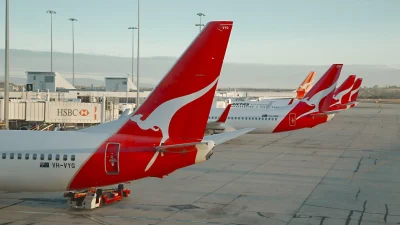Why Pendal still backs ‘very strong’ Qantas franchise



Qantas shareholder, Pendal Group, is holding strong that the national carrier is a very strong franchise which is being undervalued by markets as it works to resolve its issues.
Qantas reported statutory profit after tax of $1.74 billion in FY23 while conceding an “acute loss of trust from the community” and “accumulated disappointment from customers” which it said it was determined to fix.
It also acknowledged legal action from the Australian Competition and Consumer Commission (ACCC) for allegedly advertising tickets for more than 8,000 flights that it had already cancelled but not removed from sale.
To top off a difficult month for the national carrier, its then-chief executive, Alan Joyce, was summoned to appear before a Senate select committee to address anti-competition behavior and its role in rising cost of living pressures.
As at 29 September, its shares have tumbled almost 13 per cent year to date compared to gains of 1.5 per cent by the ASX 200.
In a bi-annual ASX outlook, Pendal said investors must ask themselves whether Qantas is structurally damaged and if that translates into material profit decline over the medium term as a result.
“We’re all aware of the issues at hand - the issues in terms of delays and cancellations, how they’ve dealt with credits, the level of competition which is really about the price of fares, and ultimately the most recent ACCC action.
“Clearly, the company has made a number of mistakes, strategically I think they’ve read the room wrong, but the key for us as investors is to look forward and say: can these issues be resolved?” said Pendal’s head of equities, Crispin Murray.
Pendal, which holds a 5.2 per cent stake in Qantas, is engaging with the firm, he said, and holds the belief that these issues can ultimately be solved.
Murray highlighted change was coming, first with the acknowledgement that mistakes have been made.
Recently, Qantas’ new chief executive, Vanessa Hudson, issued an apology to customers on behalf of the business, noting it had not delivered in the way it should have.
He added that the airline was actively addressing its issue around COVID credits and had also worked on its capacity, particularly in international flights, which would in turn lead to lower fares.
Most notably, it saw the exit of Joyce after a 22-year tenure in what was viewed as a much-needed leadership refresh for the national carrier.
“So, the issues [Qantas] can deal with directly are being dealt with, and clearly, we’ve also seen change at the top. I think it’s important in terms of sending a strong message that going forward, there is going to be a change in tone about the way the company is being run,” Murray said.
Looking at Qantas through an investment lens, he believed it was “fundamentally undervalued”.
He explained: “It’s understandable why – people are angry, frustrated, and that translates into the valuation of the company as people fear that decline in profits. But it is important to take a step back and say, ‘look, compared to pre-COVID, the market cap is $700 million lower, the debt is $2 billion lower, and that is factoring in the credits being returned’.
“They have a lot more assets on their balance sheets, so their real tangible assets can be monetised if need be. Their profits are materially higher, so they can absorb substantial decline in profit, and still be good value when you look at historic valuations.
“And even [with] customer metrics like frequent flyers, they still have a very strong loyalty program. While some of their customers are unhappy right now, it’s still a very powerful asset.”
According to Murray, Qantas remained a strong franchise which is being undervalued with issues that are fixable.
“It will take time, but the early signs are that they are now addressing those issues,” he said.
Recommended for you
Nuveen has made its private real estate strategy available to Australian wholesale investors, democratising access to a typically institutional asset class.
VanEck is expanding its fixed income range with a new ETF this week to complement its existing subordinated debt strategy which has received $1 billion in inflows this year.
Specialist global equities manager Nanuk has celebrated 10 years of its flagship New World Fund and is actively considering its next possible vehicle.
Australian equities manager Datt Capital has built a retail-friendly version of its small-cap strategy for advisers, previously only available for wholesale investors.












